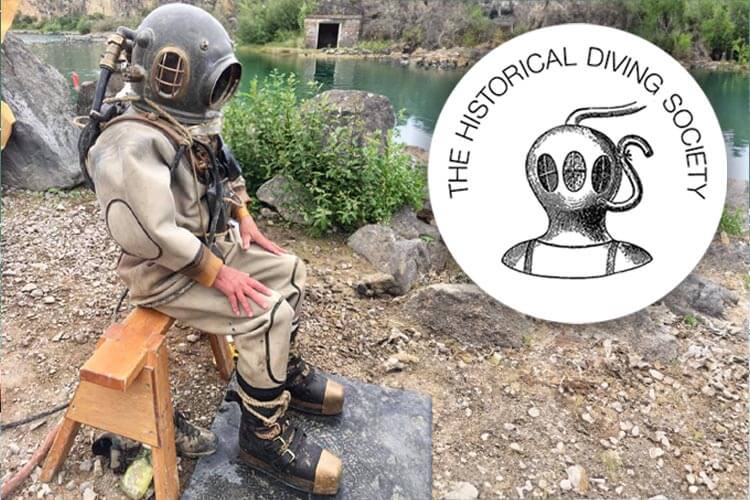
The UK’s Historical Diving Society (HDS) has announced the dates for this year’s annual conference, set to take place at the headquarters of Subsea7 in Sutton, South London, on Saturday 18 November, 2023.
The Conference has been held each year since 1990, with leading diving pioneers and researchers giving presentations, followed by the presentation of the Society’s annual awards.
Speakers this year include author Mike Welham, who will present a historical vision of Special Forces Divers; Karina Kowalska who will talk about The beginnings of the Polish Special Forces, ‘Formoza’; the development and enforcement of UK diving regulations by Bryan McGlinchy; Sven Erik Jørgensen presents the diary of a 1950s wreck diver salvaging batteries from German submarines; Finn Lennemann will talk about the history and salvage of German U-boat U-534; and Peter Dick will take a lighthearted look at diving history.
The conference is open to all, and not restricted to members of the HDS. Tickets for the 2023 event are on sale for £40. For more details and to reserve a spot, visit www.thehds.com/events/annual-conference/
HDS Conference 2023 speakers
A Historical Vision of Special Forces Divers – Michael G. Welham

Mike’s talk will cover Special Forces diving from WW2 to the present day including Army and Navy divers of the British and other International Forces. He will focus on Dutch Frogmen, a US Special Forces female diver, and Ukrainian divers.
Mike has been involved with diving both military and civilian for some years. He began diving while serving in the Royal Marines, subsequently becoming a full-saturation commercial diver operating at depths of up to 122m (400ft) where he progressed to Diving Supervisor and Superintendent working in the North Sea, Norway, Netherlands, Brazil, Middle East, Africa and other overseas locations. He later spent 15 years as a UK Government principal diving officer.
He is the author of Combat Divers (2023), Combat Frogmen (1989), Kampf-Schwimmer [German edition of Combat Frogmen], Naval Elite Units, Maritime Spezialeinheiten (German Edition) [Maritime Special Forces], Exploring the Deep and Frogman Spy.
He is a member of the Historical Diving Society and a Member of the Combat Diver Foundation (CDF – USA) and has assisted with the museum’s SDV history section.
Today, he continues to research the historical role and activities of combat divers, their evolution, equipment, craft and operations on a worldwide basis. His focus is now on the future of diver/underwater activity.
Mike’s book, Combat Divers – An Illustrated History of Special Forces Divers will be available to purchase at the Conference.
The Beginnings of the Polish Special Forces, ‘Formoza’ – Karina Kowalska

After receiving a master’s degree in political science and journalism at Warsaw University, Karina worked for a time at the British Embassy before becoming a consultant to a British company which provides services to those setting up commercial activities in Eastern Europe. She has published several books on diving in Poland; she also translates diving books into Polish.
In 2006 she opened the first diving museum in Poland in Warsaw. She is married to Grzegorz who is a Professor at Warsaw University. He is also a diver, one of the largest wholesalers of diving equipment in Poland and a noted rally driver.
Modern GB Diving Regulations – Development and Enforcement – Bryan McGlinchy

Bryan McGlinchy will outline his views on why it was necessary to develop modern diving regulations in Britain during the 1980s and then modernise the regulations in the 1990s. Bryan will refer to case histories from diving accident investigations he was involved with while working as an HSE Diving Inspector, to illustrate how diving regulations are used in practice by British authorities.
Bryan began his career as a diver in the early eighties, and worked for a variety of diving contractors in the Middle East, India, North Sea, and West Africa. Over a fifteen-year period he took part in a wide range of commercial diving activities before joining the International Marine Contractors Association (IMCA) in 2012 as a Technical Adviser – Diving from the UK Health and Safety Executive. He spent more than 12 years as a Diving Specialist Inspector, responsible for the inspection of all sectors of the diving industry in Great Britain and for the investigation of accidents, incidents and complaints related to diving at work, both onshore and offshore.
Bryan also supervised a number of diving research projects and developed diving industry guidance on behalf of the Executive. He also worked on diving topic assessment of oil and gas company safety cases.
A wreck diver’s diary: Salvage of batteries from German submarines in Hørup Hav 1950-51 – Sven Erik Jørgensen

The Second World War, like other wars, had been hard on resources. After the war, the metals lying at the bottom of the sea were needed. For most of the ships that sank in the Atlantic, the metals were gone forever. In the shallow Danish waters, the metals were within the divers’ reach.
Wreck divers Harry Olsen and Peter Christensen blasted their way down into four submarines in the Hørup Sea. The submarines were at a depth of 30 meters and lying in mud up to the deck. In total darkness and surrounded by sharp metal, they had to handle the batteries weighing up to 300 kg.
Harry Olsen described the hard work, a working day on the bottom of up to 5 hours, the dangerous situations and the never-ending battle against the decompression sickness in his diary and elaborated on it to Sven Erik Jørgensen in 2002. Diving safety was as expected in the 50s, but it was far from the safety requirements of today.
The history and salvage of the German U-boat U534 – Finn Linnemann

Finn Linnemann’s talk is about the history and salvage of the German U-boat U534 which is now on display at Birkenhead, England.
Finn Linnemann joined the merchant navy in 1957 at the age of 15. After 3 years he joined the Royal Danish Navy and trained in underwater weapons and diving. He qualified as a Petty Officer and by 1970 had become a sub-lieutenant. For the next 14 years, he carried out various duties on board fishery protection frigates, minelayers, surveying units and training ships passing courses both in Denmark and abroad related to navigation, hydrography, mine warfare and explosive ordnance
disposal.
In 1985 he was appointed head of Naval Explosive Ordnance Disposal Service while also acting as a representative in NATO working groups related to diving, explosive ordnance, mine warfare and shallow water warfare. In 1990 he was appointed commander, before reitiring from the Service in 2002, aged 60.
Linnemann established his own company specialising in harbour security and worked for several years supervising bomb disposal operations in Serbia. He was a founding member of the Danish Historical Diving Society and is an elected member of the committee.
A Humorous View of Diving – Peter Dick

A Lighthearted look at diving by way of cards and illustrations – a brief, lighthearted look at diving through the ages through cartoons and illustrations.
Peter Dick joined the British Sub-Aqua Club in his teens at the end of 1955. He began his working life in Kodak Research Laboratories, ran the first recreational diving school on the island of Malta, travelled and eventually became a deep diver in the North Sea oil and gas sector.
He ended his career as a consultant in underwater engineering. Since 2003 he has edited the Historical Diving Times and latterly the International Journal of Diving History for the Historical Diving Society.


